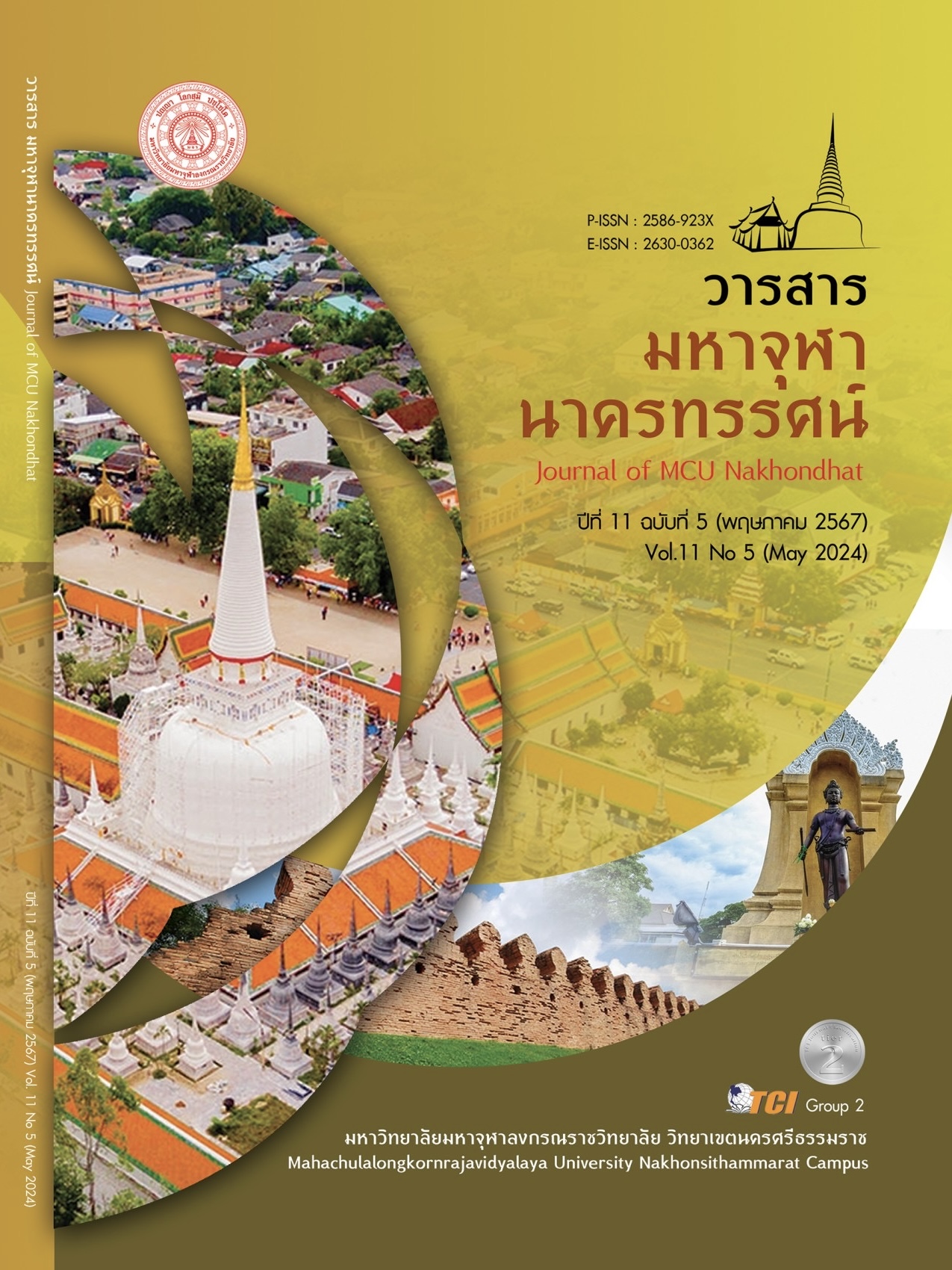ภาวะผู้นำเชิงจิตวิญญาณ ความพึงพอใจในงานกับผลการปฏิบัติงาน ของเจ้าหน้าที่ตำรวจชุมชนสัมพันธ์ สังกัดกองบังคับการตำรวจนครบาล 1-9
Main Article Content
บทคัดย่อ
การวิจัยครั้งนี้มีวัตถุประสงค์ 1) เพื่อศึกษาระดับภาวะผู้นำเชิงจิตวิญญาณ ความพึงพอใจในงานกับผลการปฏิบัติงานของเจ้าหน้าที่ตำรวจชุมชนสัมพันธ์ สังกัดกองบังคับการตำรวจนครบาล 1-9 2) เพื่อศึกษาอิทธิพลของภาวะผู้นำเชิงจิตวิญญาณ ความพึงพอใจในงานกับผลการปฏิบัติงานของเจ้าหน้าที่ตำรวจชุมชนสัมพันธ์ สังกัดกองบังคับการตำรวจนครบาล 1-9 และ 3) เพื่อศึกษาอิทธิพลทางอ้อมของภาวะผู้นำเชิงจิตวิญญาณที่ส่งผ่านความพึงพอใจในงานต่อผลการปฏิบัติงานของเจ้าหน้าที่ตำรวจชุมชนสัมพันธ์ สังกัดกองบังคับการตำรวจนครบาล 1-9 การวิจัยครั้งนี้เป็นการวิจัยเชิงปริมาณ กลุ่มตัวอย่าง ได้แก่ เจ้าหน้าที่ตำรวจชุมชนสัมพันธ์ จำนวน 264 คน สุ่มตัวอย่างแบบอย่างง่าย เครื่องมือ ได้แก่ แบบสอบถามมาตราส่วนประมาณค่า 6 ระดับ สถิติที่ใช้ในการวิเคราะห์ข้อมูล ได้แก่ ค่าเฉลี่ย ส่วนเบี่ยงเบนมาตรฐาน วิเคราะห์สมการโครงสร้างและวิเคราะห์เส้นทาง ผลการวิจัยพบว่า ระดับภาวะผู้นำเชิงจิตวิญญาณ ระดับความพึงพอใจในงานและระดับผลการปฏิบัติงานของเจ้าหน้าที่ตำรวจชุมชนสัมพันธ์อยู่ในระดับมาก ภาวะผู้นำเชิงจิตวิญญาณมีอิทธิพลต่อผลการปฏิบัติงานของเจ้าหน้าที่ตำรวจชุมชนสัมพันธ์อย่างมีนัยสำคัญทางสถิติที่ระดับ .01 ความพึงพอใจในงานมีอิทธิพลต่อผลการปฏิบัติงานของเจ้าหน้าที่ตำรวจชุมชนสัมพันธ์อย่างมีนัยสำคัญทางสถิติที่ระดับ .01 ภาวะผู้นำเชิงจิตวิญญาณมีอิทธิพลทางอ้อมต่อผลการปฏิบัติงานโดยส่งผ่านความพึงพอใจในงานอย่างมีนัยสำคัญทางสถิติที่ระดับ .01 ผลการวิจัยพบว่า ความพึงพอใจในงานเป็นตัวแปรส่งผ่านที่ดีของภาวะผู้นำเชิงจิตวิญญาณที่ส่งผลต่อการปฏิบัติงาน ดังนั้นในการเพิ่มผลการปฏิบัติงานอาจกระทำโดยการเพิ่มระดับความพึงพอใจในงาน
Article Details

อนุญาตภายใต้เงื่อนไข Creative Commons Attribution-NonCommercial-NoDerivatives 4.0 International License.
เอกสารอ้างอิง
ลัดดา จุลวงศ์และศักดิ์ชัย นิรัญทวี. (2363). การบริหารสถานศึกษาด้วยภาวะผู้นำเชิงจิตวิญญาณ. วารสารวิชาการและวิจัยสังคมศาสตร์, 15(1), 17–30.
วิษณุ นวนมุสิด. (2562). การปฏิบัติหน้าที่ของตำรวจชุมชนสัมพันธ์ในการป้องกันและแก้ไขปัญหาอาชญากรรม: กรณีศึกษากองบัญชาการตำรวจนครบาล. กรุงเทพมหานคร: มหาวิทยาลัยรามคำแหง.
สำนักงานตำรวจแห่งชาติ. (2566). แนวทางการปฏิบัติงานตามนโยบายการบริหารราชการสำนักงานตำรวจแห่งชาติ ประจำปีงบประมาณ พ.ศ.2567. เรียกใช้เมื่อ 10 ธันวาคม 2566 จาก http://www. royalthaipolice.go.th/
Aamodt, M., G. (1996). Applied Industrial/Organizational Psychology (4th edition.). Oxford: Brooks/Cole.
Azmy, A. et al. (2023). The influence of transformational leadership and organizational culture on employee performance at PT. Retrieved December 10, 2023, from https://doi.org/10.2991/978-94-6463-244
Chen, C.-Y., & Yang, C.-F. (2012). The impact of spiritual leadership on organizational citizenship behavior: A multi-sample analysis. Retrieved December 10, 2023, from http://doi:10.1007/s10551-011-0953-3
Conger, J. A., & Kanungo, R. N. (1998). Charismatic leadership in organizations. SAGE Publications, 1(5), 56-79.
Dalal, R. S. et al. (2012). The relative importance of employee engagement, other job attitudes, and trait affect as predictors of job performance. Journal of Applied Social Psychology, 42(S1), E295-E325.
Fry, L. W. (2003). Toward a theory of spiritual leadership. Leadership Quarterly, 14(6), 693–727.
Fry, L. W., & Matherly, L. (2006). Spiritual leadership and organizational performance. Paper Presented at the Academy of Management. Atlanta: Georgia.
George, J., & Jones, G. (2002). Understanding and managing organizational behavior. Atlanta: Addison-Wesley.
Kawiana, I. G. P., & Riana, I. G. (2016). The Mediating Effect of Calling on Spiritual Leadership and Job Satisfaction in Village Credit Institution. Scientific Journal of PPI - UKM, 3(6), 276-282.
Koesmono, H. T. (2005). Pengaruh Budaya Organisasi Terhadap Motivasi dan Kepuasan Kerja Serta Kinerja Karyawan Pada Sub Sektor Industri Pengolahan Kayu Skala Menengah Di JawaTimur. Jurnal Manajemen & Kewirausahaan, 7(2), 171-188.
Koustelios, A. & Bagiatis, K. (1997). The employee satisfaction inventory (ESI): development of a scale to measure satisfaction of Greek employees. Educational & Psychological Measurement, 3(8), 469-476.
Manel, D. R. et al. (2023). Analyzing the effect of organizational commitment, spiritual motivation and spiritual leadership on employee performance through job satisfaction. International Journal of Finance. Economics and Business, 2(1), 34-43.
Musta’in, M. M. et al. (2014). A study on employees performance: Spiritual leadership and work motivation with mediation work satisfaction at the university of Darul Ulum, Indonesia. European Journal of Business and Management, 6(39), 77-86.
Pio, R. J. (2022). The mediation effect of quality of worklife and job satisfaction in the relationship between spiritual leadership to employee performance. International Journal of Law and Management, 64(1), 1-17.
Pio, R. J. et al. (2018). The influence of spiritual leadership on quality of work life, job satisfaction and organizational citizenship behavior. International Journal of Law and Management, 60(2), 35-48.
Rotundo, M., & Sackett, P. R. (2002). The relative importance of task, citizenship, and counterproductive performance to global ratings of job performance: A policy-capturing approach. Journal of Applied Psychology, 87(1), 66–80.
Sackett, P. R., & Lievens, F. (2008). Personnel selection. Annual Review of Psychology, 59(2008),419-450.
Sani, A. et al. (2016). The effect of spiritual leadership on workplace spirituality, job satisfaction and Ihsan behaviour (a study on nurses of Aisyiah Islamic Hospital in Malang, Indonesia). International Journal of Applied Business and Economic Research, 14(11), 7675-7688.
Smith, P. C. et al. (1969). The measurement of satisfaction in work and retirement. Amsterdam: Rand McNally.
Spector, P. E. (2008). Industrial and organizational psychology. Wiley Research and Practice, 5(2008), 55-67.
Vakola, M., & Nicholaou, I. (2012). Organizational psychology & behaviour. Oxford: Rosili.
Veechio, R. P. (2000). Organizational behavior : Core concepts. LA: Dryden Press.
Weiss, R. V et al. (1976). Manual for the Minnesota Satisfaction Questionnaire. Minneapolis: Industrial Relations Center, University of Minnesota. Minnesota: University of Minnesota.
Yousef, A. D. (1998). Satisfaction With Job Security as a Predictor of Organizational Commitment and Job Performance in a Multicultural Environment. International Journal of Manpower, 19(3), 187-194.


